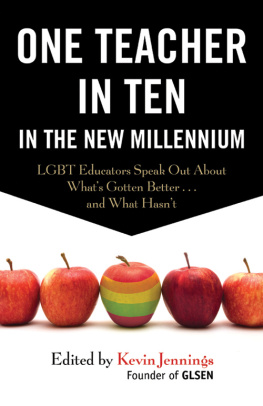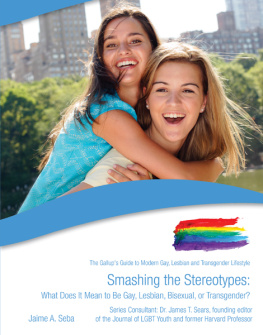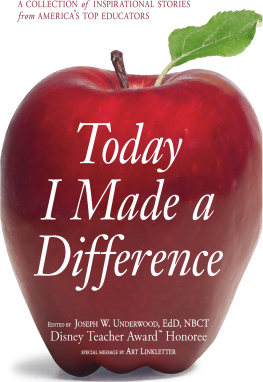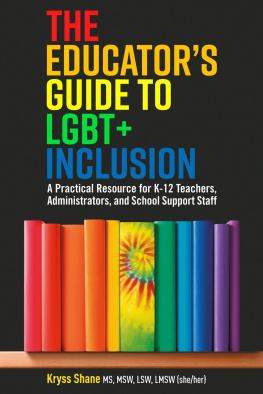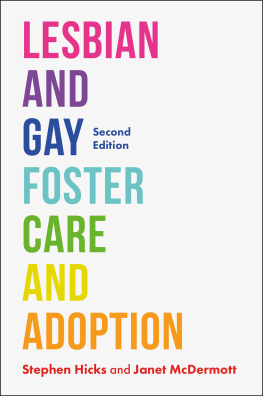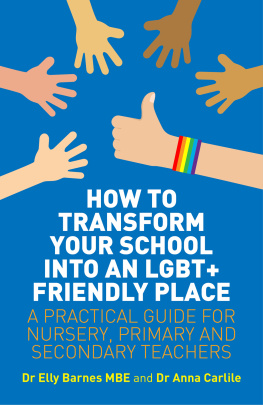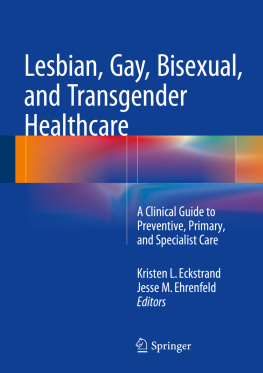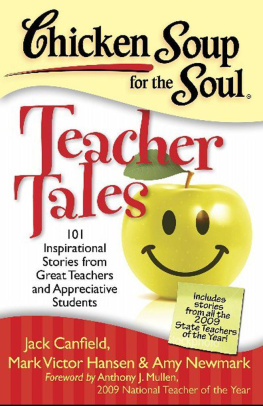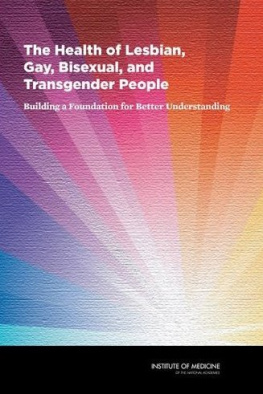
BEACON PRESS
Boston, Massachusetts
www.beacon.org
Beacon Press books
are published under the auspices of
the Unitarian Universalist Association of Congregations.
2015 by Kevin Jennings. Authors retain copyright to their individual pieces of work. All rights reserved.
Printed in the United States of America
18 17 16 15 8 7 6 5 4 3 2 1
This book is printed on acid-free paper that meets the uncoated paper ANSI/NISO specifications for permanence as revised in 1992.
Text design and composition by Kim Arney
Library of Congress Cataloging-in-Publication Data
One teacher in ten in the new millennium : LGBT educators speak out about whats gotten better and what hasnt / edited by Kevin Jennings.
pages cm
eISBN 978-0-8070-5587-8
ISBN 978-0-8070-5586-1 (paperback)
ISBN 978-0-8070-5587-8 (ebook)
1. Gay teachersUnited StatesBiography. 2. Lesbian teachersUnited StatesBiography. 3. Bisexual teachersUnited StatesBiography. 4. Transgender teachersUnited StatesBiography. I. Jennings, Kevineditor.
LB2844.1.G39O645 2015
371.100'8664dc23
2015000514
For Jeff and for our furry kids
Luke (19992000)
Amber (20002012)
Ben (20062014)
Jackson
Sloane

Preface
On November 10, 1988, at age twenty-five, I strode to the podium of the chapel at the school where I taught (Concord Academy in Concord, Massachusetts) and gave a fifteen-minute talk in which I came out as gay to my students.
It was a very different time for LGBT people in 1988. Ronald Reagan was president. AIDS, a disease for which no treatment was available, was claiming the lives of tens of thousands of gay men like me. Only one state protected people from being fired because of their sexual orientation, and it wasnt Massachusetts. (Wondering which one? Answer at the end of the book.)
I knew no one who had ever done what I was doing. I had never met an openly LGBT teacher. K12 schools had no organizations dedicated to LGBT issues. I felt like I was diving off a cliff.
Much of my life has been spent trying to correct the injustices I saw in the schools I attended and in the ones where I taught, injustices that led me to that podium on November 10, 1988. A few weeks after coming out I would support students in creating the nations first Gay-Straight Alliance (GSA), at Concord Academy. Two years later (in 1990) I would found what became the Gay, Lesbian, and Straight Education Network (GLSEN) to provide support to those who wanted to create change in their schools. And six years later (in 1994) I would edit the first edition of One Teacher in Ten, hoping to provide stories that would make sure no LGBT teacher ever felt alone again.
The first edition of One Teacher in Ten reflected the time in which it was written. Many contributors were closeted. Some used pseudonyms for themselves, their schools, or their communities as they feared what might happen should their identities become known. The collection was a very mixed bag.
In 2004 I decided to come out with an all-new edition of the anthology, as I was curious if things had changed. Indeed they had. Virtually all contributors were out, and success stories abounded. It was clear that progress was being made.
When I decided in 2014 to do an all-new third edition of this anthology, I was even more intrigued by what might have changed (or not changed) since I had come out more than a quarter century before. The results are in the volume you hold in your hands, which I have organized as follows:
The section Signs of Change features stories that reflect the progress that is being made, with stories as varied as a first-year out teacher in the Midwest and a veteran out teacher in Virginia.
Unexpected Journeys contains essays in which the authors describe odysseys they could not have predicted would occur, with many becoming accidental activists along the way.
The Struggle Continues demonstrates how much work remains to be done, even in places as seemingly accepting as Holland and New York City.
My greatest joy in editing this collection was its diversity. Contributors come from four countries (including the United States) and eleven different US states. Contributors include closeted teachers in New York City and out teachers in the South, defying the stereotypes that are commonly held about the levels of acceptance of LGBT people in different regions of the United States. Voices that were rare or absent from the first two editions, including those of people of color, transgender people, and people from outside the United States, now make up more than half of all contributors. The spectrum of experiences and backgrounds is inspiring.
I hope someday there will be no need for decennial editions of One Teacher in Ten. The inspiring stories found in this edition make me believe that day is within reach, and I profoundly thank all the contributors for sharing their stories.
Kevin Jennings
Prologue: Forget the Rest
Mzoli
HIGH SCHOOL ENGLISH LANGUAGE
AND LITERATURE TEACHER
Cape Town, South Africa
I am _____, first.
I am not gay.
I am not brown.
I am not a woman.
Walking through the hallways, youll see what you want to. Youll look out for my comment confirming your belief of who I am. You dont understand why I wear skirts; why I wear my hair down. You dont understand why I dont hate men. You wont try to understand. You accept that I love rugby. You accept that I love hockey. You accept that I love beer and motorbikes. You accept what you understand. But you wont accept me as I see myself.
I am _____, first.
_____ is someone who forgets her partner is a woman. She forgets her lunch at home. She forgets shes brown. She forgets to buy milk. She forgets shes gay.
I am _____ first. Forget the rest.
PART 1

Signs of Change
Coming Out for Owen
Alan Yount
SIXTH-GRADE TEACHER
School of the Future (M413)
New York, New York
Every year of my ten-year teaching career in New York City public schools began with the same required writing-project assignment: write a small-moment story about yourself that teaches us a life lesson or something important about you. I hated the assignment for many reasonsI was sick of reading how kids overcame fear (that they didnt have) by riding a roller coaster; how a trip to the Poconos changed their life; how beating their brother at some video game taught them about competitionbut I mostly hated the assignment because of how it put me back in the closet.
I came to teaching in my forties as a New York Teaching Fellow, after careers in nursing and as a lawyer. I had been out for decades; I had been out in my previous careers; and I was out to my fellow teachers and principals and instructors. I was not, however, out to my students.
I taught fifth and sixth grades, and I never saw the need to tell them about my sexual orientation. The word sexual in that descriptor gave me pause in coming out to them: Fifth or sixth graders dont need to know who I sleep with, I thought.

